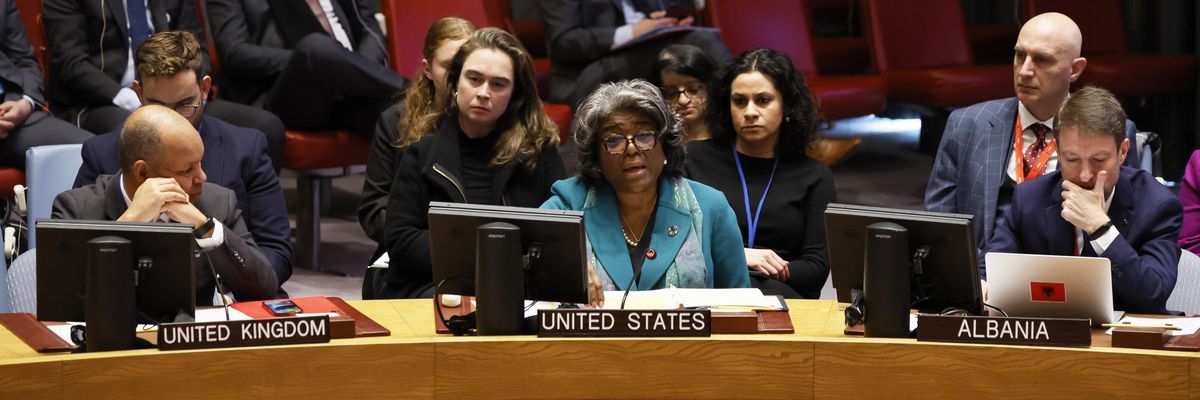Ahead of an expected vote Friday evening, human rights advocates said there would be "no justification" for the U.S. to block a United Nations Security Council resolution calling for an immediate cease-fire in the Gaza Strip, where the humanitarian situation is becoming more grave by the hour as Israeli bombings and ground operations intensify.
The U.S.—one of five permanent Security Council members with veto power—has not explicitly threatened to veto the new resolution, which was
put forth by the United Arab Emirates after U.N. Secretary-General António Guterres on Wednesday took the extraordinary step of invoking Article 99 of the U.N. Charter in an effort to spur the international body to action.
But Robert Wood, deputy U.S. ambassador to the U.N., told Reuters that the Biden administration doesn't support any additional Security Council resolutions on Gaza at this time.
A vote on the UAE-led measure is expected at around 5:30 pm ET on Friday, though some officials—including France's ambassador to the U.N.—have said the vote should be delayed.
"Every minute we wait, people are dying, the risks to global peace are multiplying."
Agnès Callamard, secretary-general of Amnesty International, said in a statement Thursday that the U.S. and other Security Council members "have a clear obligation under international law to prevent atrocities."
"There can be no justification for continuing to block meaningful action by the U.N. Security Council to stop massive civilian bloodshed, the complete collapse of the humanitarian system, and even worse horrors resulting from the breakdown of public order and massive displacement," said Callamard. "Moral clarity, global leadership, and the imperative duty to protect civilians must prevail with the immediate adoption of a cease-fire resolution."
"Every minute we wait, people are dying, the risks to global peace are multiplying," she added. "Selective application of international law must end. We simply don't have the time for procrastination, or political posturing."
Last month, the Security Council approved a resolution calling for "extended humanitarian pauses" in Gaza. The U.S., which is providing arms and political support for Israel's assault on the Palestinian territory, vetoed an earlier resolution, citing the absence of an explicit acknowledgment of Israel's right to defend itself. In October, the U.S. voted against a Russia-led resolution that called for a cease-fire.
U.N. Security Council resolutions are legally binding, but Israel—which is not a member of the body—regularly flouts them.
In addition to calling for an "immediate humanitarian cease-fire," the UAE resolution would reiterate the Security Council's "demand that all parties comply with their obligations under international law" and urge "the immediate and unconditional release of all hostages, as well as ensuring humanitarian access."
Christopher Lockyear, secretary-general of Médecins Sans Frontières International, said in a statement Friday that "failure to act now, to enact a total cease-fire and end the siege, would be unforgivable."
Speaking to the council on Friday, Guterres said that Gazans are "looking into the abyss" and implored members of the body to "spare no effort to push for an immediate humanitarian cease-fire, for the protection of civilians, and for the urgent delivery of life-saving aid."
"This is vital for Israelis, Palestinians, and for international peace and security," he added. "The eyes of the world—and the eyes of history—are watching."
The council's Friday meeting comes as nearly two million displaced Gazans are struggling to survive amid Israel's escalating offensive in the southern part of the territory. Access to uncontaminated water is becoming a luxury, infectious diseases are spreading in overcrowded shelters, the hospitals still functioning are treating wounded patients with inadequate supplies, and mass starvation is looming.
Marta Valdes Garcia, Oxfam International's humanitarian director, said Thursday that "our political leaders are failing—in abject weakness—to forge a cease-fire, which is the only possible humanitarian action that now really matters."
"The systemic, militarized chaos has overwhelmed the international humanitarian system," she added. "Our governments don't even have the smokescreen of humanitarianism to hide behind now as Israel carries out its campaign of collective punishment."
In a statement on Friday, UNRWA Commissioner-General Philippe Lazzarini, responsible for administering the United Nation's relief efforts inside the Gaza Strip, said his agency could not support its mission much longer if the Israeli assault is allowed to continue.
Citing a letter he sent to members of the U.N. General Assembly as well as the pending vote at the Security Council, Lazzarini said, "I urge all member states to take immediate actions to implement an immediate humanitarian ceasefire, enforce international law including the protection of civilians, U.N. staff, U.N. premises including shelters, medical facilities, and all civilian infrastructure and protect the prospects for a political solution vital to peace and stability and the rights for Palestinians, Israelis, the region and beyond."
"Calling for an end to the decimation of the lives of Palestinians in Gaza," he added, "is not a denial of the abhorrent attacks of 7 October in Israel. It is the opposite. It is a recognition of the equal rights of all people."




